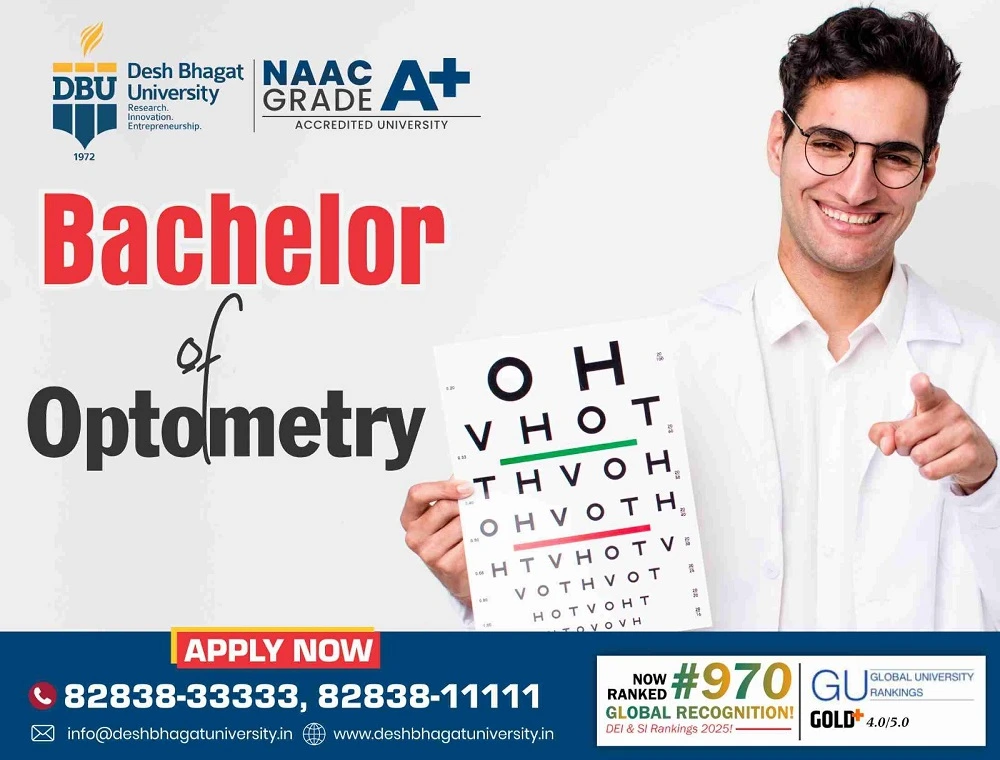Bachelor of Optometry: Salary, Course Details, Eligibility at DBU
November 14, 2025 2025-11-14 7:22Bachelor of Optometry: Salary, Course Details, Eligibility at DBU

Bachelor of Optometry: Salary, Course Details, Eligibility at DBU
At Desh Bhagat University (DBU), we believe in offering education that prepares you for successful, future‑ready careers. One such course we offer is the Bachelor of Optometry, and this article is our detailed guide for you — covering what the course is, course details, eligibility, fees, and jobs after it, and salary prospects.
What is Bachelor of Optometry?
When you enrol in the Bachelor of Optometry at DBU, you are choosing to study a professional undergraduate programme that focuses on eye‑care, vision science, corrective lenses, and diagnosing and managing eye‑related disorders. In simpler terms, you become capable of assisting in comprehensive eye‑health services, performing eye tests, prescribing glasses or contact lenses, and collaborating in clinical settings for vision care.
Optometry is distinct from general medicine: you won’t perform eye surgery like an ophthalmologist, but you will be a key part of the eye‑care team. With our Bachelor of Optometry course, you’ll gain the scientific knowledge (anatomy of eye, optics, etc.) and practical skills (refraction tests, vision screening) to work professionally in the eye care domain.
Bachelor of Optometry course details at DBU
Here are the core details of our Bachelor of Optometry course at DBU:
- Duration: At DBU, our Bachelor of Optometry (also sometimes referenced as B.Optom) is a 4 + 1 Year Internship full‑time undergraduate programme.
- Mode: Full‑time, on‑campus study.
- Curriculum: You will study foundational sciences (anatomy, physiology, and optics), vision science, ocular diseases, refraction, contact lens fitting, binocular vision and other clinical skills. For example, some sources show modules like ocular diseases, instruments, pediatric/geriatric optometry and internships.
- Practical training: The course focuses hands‑on clinical exposure, eye‑care instruments, and internships or clinical postings, so you are not only rooted in theory but also get to work with patients under supervision.
- Department: The programme is offered under our Allied Health Sciences / Para‑Medical Sciences umbrella at DBU.
In short: at DBU you will spend four years building scientific foundations, mastering eye‑care technologies, practicing clinical skills, and preparing for work in optical or hospital settings.
Bachelor of Optometry eligibility at DBU
To join the Bachelor of Optometry programme at DBU, you must meet the eligibility criteria. Here’s what you need:
- You must have passed your 10+2 (or equivalent) in the Science stream, with Physics, Chemistry and Biology as compulsory subjects.
- You must have obtained a minimum 60 % marks in your qualifying exam in the general category. Some relaxation for reserved categories may apply.
- You should meet any other conditions set by the University for Admission (document verification, application form, etc.).
- There may be some entrance test or merit‑based process depending on batch/seat availability. At DBU the admission process is largely based on meeting 10+2 marks and university norms.
By fulfilling these eligibility criteria, you become eligible to apply for the Bachelor of Optometry at DBU.
Bachelor of Optometry fees at DBU
When considering the cost of your education, it’s essential to understand the fees involved. The fees for the Bachelor of Optometry program at Desh Bhagat University (DBU) can vary based on several factors, including the specialization, the duration of the course, and any changes in the fee structure over time.
We recommend that you check the official prospectus or contact our admissions office for the most accurate and up-to-date fee information. Rest assured, the investment in this program is a step towards a promising career in the growing field of optometry, which offers excellent job prospects and professional growth opportunities.
In summary: while fees are subject to change, the overall cost of the program is an investment in a high-quality education that will equip you with the skills and knowledge to succeed in the optometry field.
Bachelor of Optometry salary & job outlook
One of the big questions is: what jobs can you do after graduation, and what salary can you expect? Here’s a breakdown at DBU and more broadly in India.
Jobs after Bachelor of Optometry
After you complete your Bachelor of Optometry at DBU, you will be qualified for a range of roles in the eye‑care and vision‑science field. Some job profiles include:
- Optometrist in eye hospital or clinic
- Clinical optometrist (in private or public hospital)
- Vision consultant in optical retail chains
- Low‑vision therapist or binocular vision specialist
- Contact lens specialist
- Optical store manager / refractionist
- Lecturer or trainer (with further qualification)
- Set up your own optical practice or join a franchise/chain
Because at DBU, we focus hands‑on training and clinical exposure, you will be ready to step into many of these roles.
Salary prospects for Bachelor of Optometry graduates
Here is what current data suggests for salary (national averages) plus what you might expect after DBU.
- Fresh graduates in Optometry (UG) in India typically earn around ₹ 2.5 lakh to ₹ 4 lakh per annum in early roles.
- With some experience (2‑5 years), earnings may move to around ₹ 4‑7 lakh per annum.
- In senior roles, especially if you move to private practice, specialized clinic, or leadership roles, salaries can go up to ₹ 10‑20 lakh per annum or more.
- On a monthly basis, data reports an average of around ₹ 19,000 per month for optometrists in India.
At DBU you will be well‑positioned to aim for these ranges. Your actual salary will depend on your location (metro vs smaller city), type of employer (hospital vs retail vs private clinic), your specialization, and your experience. The key: build your practical skills make use of internships and placement support, and you will be able to earn competitive salary soon after graduation.
Why choose DBU for your Bachelor of Optometry
Here are some reasons why DBU is a strong choice if you want to study Bachelor of Optometry:
- We are NAAC A+ accredited and our allied health sciences programmed are designed with modern infrastructure.
- Our campus houses good facilities for health sciences, paramedical labs, eye‑care technologies and clinical placements. For example, the allied health sciences page mentions state‑of‑the‑art infrastructure, clinical placements, and practical training.
- We focus industry‑oriented curriculum and hands‑on experience which matters in optometry because vision‑care is very practical.
- Our location in Punjab (Mandi Gobindgarh, Amloh Road, District Fatehgarh Sahib) means you will study in a dedicated university campus environment with focus on allied health sciences.
- Support for your career: we guide you with placements, practical experience, and help you build the skills needed for jobs.
Summary and next steps
If you are thinking: “Should I do a Bachelor of Optometry at DBU?”, here is a quick summary:
- The Bachelor of Optometry programme at DBU gives you a professional qualification in eye‑care and vision sciences.
- Duration is four years full‑time; you’ll study the science behind vision, clinical skills, equipment use and patient care.
- Eligibility: Complete 10+2 with Physics, Chemistry, Biology and required minimum marks.
- Fees: Several lakhs for the full course; check latest prospectus for exact amount.
- Jobs: After graduation you may work as optometrist, clinical specialist, vision consultant, etc.
- Salary: Fresh graduates might earn about ₹ 2.5‑4 lakh per year; with experience and specialization the earnings can improve significantly.
- DBU offers you good infrastructure, practical training and a professional environment to build your career.
What to do next? We suggest you contact DBU’s admissions team, download our prospectus, attend a campus visit if possible, and check the latest seats, fee structure, scholarship options and placement stats for the Bachelor of Optometry course.
At DBU, we are committed to helping students build careers that matter — in the important field of eye‑care and vision health. If you’re passionate about helping people see better and aspire to a career in optometry, we welcome you to explore the Bachelor of Optometry programme with us.

FAQs
1. What is the Bachelor of Optometry program?
The Bachelor of Optometry is an undergraduate course that trains students to become optometrists. Optometrists help diagnose and treat vision problems, prescribe glasses and contact lenses, and manage eye health. At Desh Bhagat University (DBU), this course combines theory and practical training to prepare you for a career in eye care.
2. What subjects will I study in the Bachelor of Optometry course at DBU?
In the Bachelor of Optometry program at DBU, you will study subjects like human anatomy, physiology, optics, visual perception, ocular diseases, refraction, contact lenses, and clinical practices. The course is designed to give you a strong understanding of both the science and practical skills needed for eye care.
3. What are the eligibility requirements for the Bachelor of Optometry course?
To be eligible for the Bachelor of Optometry program at DBU, you need to have completed your 10+2 with Physics, Chemistry, and Biology as subjects. You should have at least 60% marks in your 10+2 exams.
4. How long is the Bachelor of Optometry course at DBU?
The Bachelor of Optometry course at Desh Bhagat University is a 4-year program. The course includes both classroom lectures and practical training, ensuring that you gain the necessary skills to become an optometrist. You will also complete internships during the course to get hands-on experience in clinical settings.
5. What career options are available after completing the Bachelor of Optometry?
After completing the Bachelor of Optometry at DBU, you can work in various roles such as optometrist, clinical optometrist, vision consultant, and low-vision specialist. You can also choose to set up your own optical practice, work in optical retail, or pursue teaching and research roles in the field of optometry.
6. What is the salary range for optometrists in India?
The salary for a fresh optometrist in India typically starts at around ₹2.5 lakh to ₹4 lakh per year. With more experience, optometrists can earn ₹4 lakh to ₹7 lakh annually. Senior optometrists or those working in private practice can earn up to ₹10 lakh or more annually, depending on their experience and expertise.
7. Are there any scholarships or financial aid options available for the Bachelor of Optometry program at DBU?
Yes, Desh Bhagat University offers several scholarships and financial aid options to deserving students. These scholarships are based on academic performance, entrance exam scores, and financial need. You can contact the admissions office for more details about available scholarships and the application process.
8. What makes DBU’s Bachelor of Optometry program unique?
DBU’s Bachelor of Optometry program stands out due to its strong focus on practical training, clinical experience, and state-of-the-art facilities. The program combines theoretical knowledge with hands-on skills, ensuring that students are well-prepared for real-world challenges in the optometry field. DBU also offers placement assistance to help students find jobs after graduation.
9. What are the job opportunities for optometrists after graduation?
After completing the Bachelor of Optometry course at DBU, you can work in various settings like eye hospitals, optical clinics, retail optical stores, and public health institutions. You can also specialize in areas like pediatric optometry, contact lenses, low vision care, and more. The demand for optometrists is growing, offering many career opportunities.
10. Can I pursue higher education after completing the Bachelor of Optometry?
Yes, after completing the Bachelor of Optometry at DBU, you can pursue higher education in Optometry, Vision Science, Healthcare Management, or Public Health. You can also specialize in fields like Low Vision Rehabilitation, Contact Lens Practice, or Ocular Pharmacology. Some graduates opt for Master’s programs or PhD studies to improve their careers.






